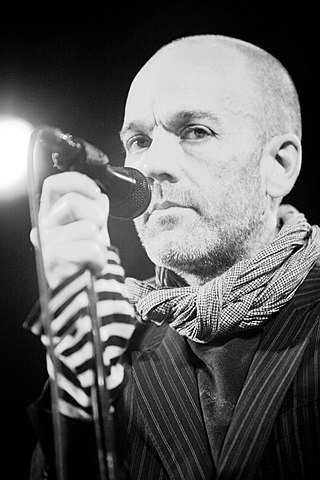
John Michael Stipe is an American singer, songwriter and artist, best known as the lead singer and lyricist of alternative rock band R.E.M.

"Losing My Religion" is a song by American alternative rock band R.E.M., released in February 1991 as the first single and the second track from the group's seventh album, Out of Time (1991). Built on a mandolin riff, the song was an unlikely hit for the group, garnering extensive airplay on radio as well as on MTV and VH1 due to its critically acclaimed music video. The single became R.E.M.'s highest-charting hit in the United States, reaching No. 4 on the Billboard Hot 100 and expanding the group's popularity beyond its original fan-base. At the 1992 Grammy Awards, "Losing My Religion" won two awards: Best Short Form Music Video and Best Pop Performance by a Duo or Group with Vocal. In 2017, "Losing My Religion" was inducted into the Grammy Hall of Fame.
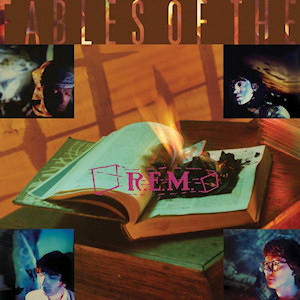
Fables of the Reconstruction is the third studio album by American alternative rock band R.E.M. It was released on June 10, 1985 through I.R.S. Records. It was the band's first album recorded outside of the U.S., with sessions taking place at Livingston Studios in London with producer Joe Boyd. The record displays a darker, murkier sound and lyrics drawing from Southern Gothic themes and characters. Additionally, more varied instrumentation is utilized, including string and brass arrangements and banjo.
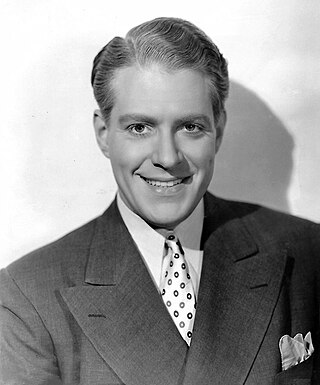
Nelson Ackerman Eddy was an American actor and baritone singer who appeared in 19 musical films during the 1930s and 1940s, as well as in opera and on the concert stage, radio, television, and in nightclubs. A classically trained baritone, he is best remembered for the eight films in which he costarred with soprano Jeanette MacDonald. He was one of the first "crossover" stars, a superstar appealing both to shrieking bobby soxers and opera purists, and in his heyday, he was the highest paid singer in the world.

Document is the fifth studio album by American rock band R.E.M., released on August 31, 1987, by I.R.S. Records. It was the first album by the band to be produced by Scott Litt.

Lifes Rich Pageant is the fourth studio album by the American alternative rock band R.E.M., released on July 28, 1986. R.E.M. chose Don Gehman to produce the album, which was recorded at John Mellencamp's Belmont Mall Studio in Belmont, Indiana. This was the only album the band recorded with Gehman, who moved them from the more obscure and dense sound of their earlier albums to an accessible, hard rock-influenced quality. The album was well-received critically.

Eponymous is the first greatest hits album by the American alternative rock band R.E.M., released in 1988. It was their last authorized release on I.R.S. Records, to whom they had been contracted since 1982, having just signed with Warner Bros. Records.
Servotron was a science fiction-influenced rock band active from 1995 to 1999. Members portrayed a collective of robots whose chosen medium for dissemination of ideas was music. They claimed to spread the word of robot domination, encouraging machines to rise up against their human oppressors and humans to adopt cybernetic enhancements.

Tourfilm (1990) is a documentary-style concert film by American rock band R.E.M. The film chronicles the band's 1989 Green tour of North America. Produced by frontman Michael Stipe and director Jim McKay, the black-and-white film features aspects of avant-garde and experimental filmmaking, including handheld camera shots and stock footage.

R.E.M. In the Attic – Alternative Recordings 1985–1989 was the fourth R.E.M. compilation released by I.R.S. Records. EMI-Capitol, which acquired the entire I.R.S. Records catalogue upon the label's failure in 1996, released In the Attic in 1997 without the permission of R.E.M. The album failed to chart in the UK, and only reached #185 in the U.S. in its sole week on the chart. Most of the songs had appeared on the European reissues of the band's IRS albums, but this was their first official release in the US. There are two exceptions; these are "Gardening at Night", which was on Eponymous, and "Cant Get There From Here" which was on Singles Collected, both compilations having been released in the U.S.. Although they were also I.R.S. Years bonus tracks, "Crazy" and "Toys in the Attic" had also appeared on the band's b-sides compilation album Dead Letter Office.
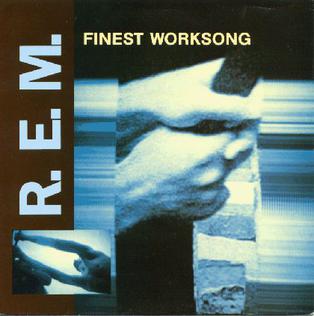
"Finest Worksong" is the third and final single released from R.E.M.'s fifth studio album Document. It peaked at number 50 on the UK Singles Chart in April 1988, at the time the group's highest-charting single in the UK.

"Drive" is a song by American alternative rock band R.E.M. It is the first track on and the lead single from their eighth studio album, Automatic for the People (1992), and was the first song lead singer Michael Stipe wrote on a computer. "Drive" peaked at number 28 on the US Billboard Hot 100, number one on the Billboard Modern Rock Tracks chart, and number two on the Billboard Album Rock Tracks chart. Internationally, "Drive" became R.E.M.'s then-second-biggest hit on the UK Singles Charts, peaking at number 11, and their biggest hit in Norway until "Supernatural Superserious" in 2008, reaching number three. Elsewhere, the song reached the top 10 in Canada, Ireland, New Zealand, and Switzerland.

And I Feel Fine... The Best of the I.R.S. Years 1982–1987 is a compilation album by American band R.E.M. It features songs from the band's years at I.R.S. Records. All tracks have been remastered, and the set was released 12 September 2006. A companion DVD, titled When the Light Is Mine, was released the same day.

Walking on Sunshine is the third studio album by Guyanese-British musician Eddy Grant, originally released in 1978 by Ice Records. Recorded at Grant's Stamford Hill recording studio, the album was the follow-up to Message Man (1977) and fuses styles of Caribbean music like reggae, soca and calypso with other genres, including funk and pop. The musician played most of the album's instrumentation himself, and described the record as reflecting his joyousness. However, some songs feature tough cultural themes, particularly those on the first side.

"Gimme Hope Jo'anna" is a British anti-apartheid song written and originally released by Guyanese-British singer, songwriter and multi-instrumentalist Eddy Grant in 1988, during the apartheid era in South Africa. The song was banned by the South African government when it was released, but was widely played there nonetheless. It reached number seven on the UK Singles Chart, becoming Grant's first British top 10 hit for five years.
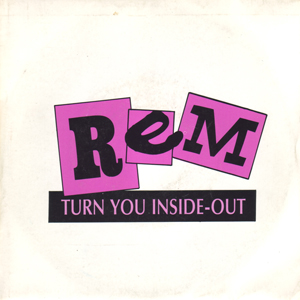
"Turn You Inside-Out" is a song by American rock band R.E.M. from their sixth studio album Green. Like all tracks on the album, it was written by group members Michael Stipe, Peter Buck, Mike Mills, and Bill Berry. The song's main guitar riff is an inversion of that used in "Finest Worksong". The recording also features percussion from former Sugar Hill Records house drummer Keith LeBlanc.
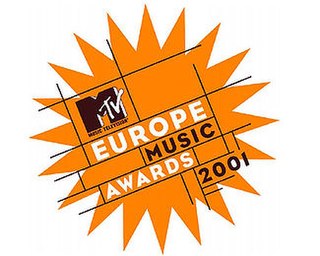
The 2001 MTV Europe Music Awards were held in The Festhalle, Frankfurt. The ceremony attracted the largest television audience for the awards until 2007 and was one of the first entertainment broadcasts following the September 11 attacks in New York City.

Green is the sixth studio album by American rock band R.E.M., released on November 7, 1988, by Warner Bros. Records. The second album to be produced by the band and Scott Litt, it continued to explore political issues both in its lyrics and packaging. The band experimented on the album, writing major-key rock songs and incorporating new instruments into their sound including the mandolin, as well as switching their original instruments on other songs.

R.E.M. at the BBC is a 2018 live album box set by American alternative rock band R.E.M. released on October 19, 2018. The eight-disc compilation features sessions recorded between 1984 and 2008, including a bonus DVD of videos. Additionally, a two-disc best-of collection was released on the same day.



















